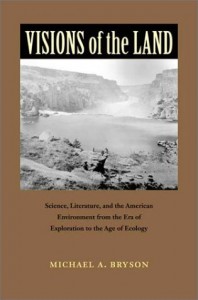 Science, Literature, and the American Environment from the Era of Exploration to the Age of Ecology (University of Virginia Press, 2002). An ecocritical study of several American scientist-writers, including John Charles Frémont, Susan Fenimore Cooper, John Wesley Powell, Charlotte Perkins Gilman, Richard Byrd, Rachel Carson, and Loren Eiseley. Part of the book series, “Under the Sign of Nature: Explorations in Ecocriticism.”
Science, Literature, and the American Environment from the Era of Exploration to the Age of Ecology (University of Virginia Press, 2002). An ecocritical study of several American scientist-writers, including John Charles Frémont, Susan Fenimore Cooper, John Wesley Powell, Charlotte Perkins Gilman, Richard Byrd, Rachel Carson, and Loren Eiseley. Part of the book series, “Under the Sign of Nature: Explorations in Ecocriticism.”
Selected reviews of Visions of the Land
“The texts discussed in Visions of the Land are not only valuable historical documents but also strong literary performances in their own right. The combination of works is original and compelling, and the book is commendable for expanding the idea of the literary to include a range of genres. Its example may inspire teachers to add Frémont or Powell or, for that matter, Clarence King or Gifford Pinchot . . . to their syllabi. And there can be little doubt that the chronicle of increasing scientific self-awareness and environmental sensitivity Bryson relates is accurate. But, as Bryson comments ruefully in his afterword, the pervasive signs of accelerating global degradation are ‘a humbling reminder of how far we have to go toward effective environmental stewardship’ (p. 177). It is perhaps not too much to say that, in detailing how far we have come, Visions of the Land has nudged us one step closer to that goal.”
— Nina Baym, Swanland Endowed Chair in English, University of Illinois
(New England Quarterly 76.1, March 2003)
“Bryson’s Visions of the Land . . . [is an] ambitious book [that] investigates the fundamental connections between science, the natural world, and human community.”
— Robert Michael Pyle, distinguished scientist and author
(Western American Literature 38.4, Dec. 2004)
“In this ambitious work, Michael A. Bryson draws upon a wide array of references (narratives, technical reports, natural histories, scientific autobiographies, fictional utopias, and popular scientific literature) to better illustrate the constantly changing manner in which our culture has chosen to conceptualize nature. . . . What are we to make of a collection of literature in which the authors of the source material examine a wide range of biomes, from Antarctica to the southwestern desert, to the eastern woodlands? Does Bryson succeed in weaving the narratives into a cohesive whole? Yes, without a doubt.”
— Tom Leskiw, freelance writer and naturalist
(H-Environment, H-Net Reviews, May 2004)
“Visions of the Land is profoundly interdisciplinary in its intent and largely successful in using a literary-critical methodology . . . . This book will be valuable . . . as a fine example of the practice of ecocriticism. . . . [and] a model of graceful interdisciplinarity expressed through thoughtful analyses in lucid prose. . . . Michael Bryson’s Visions of the Land is a must for literature scholars interested in ecocriticism. It should also interest historians and philosophers of science and environmental historians. This clearly written, intelligently argued, and accessible study also should appeal to non-specialists.”
— Robert Burkholder, Associate Professor of English, Penn State University (Environmental History 8, July 2003)
“Michael A. Bryson has undertaken an ambitious study of the connections between the representation of nature and the practice of science in America. . . . Bryson’s skillful weaving together of the various skeins [of Visions of the Land] has rendered them of a piece.”
— Gale E. Christianson, Department of History, Indiana State University
(Great Plains Quarterly, Winter 2004)
A “fascinating book.”
— Christoph Irmscher, Professor of English, Indiana University
(ISLE 10.1, Winter 2003)
“Michael Bryson’s ambitious and compact Visions of the Land . . . takes a multidisciplinary view of how we have represented the land over a near century-and-a-half span. . . . As a compilation of a diversity of writers and a breadth of writing formats–from exploration narratives and technical reports to natural histories and utopian novels–Visions of the Land succeeds. Bryson’s range of historical sources is vast . . . . As a contribution to a series on ecocriticism, Bryson has done a commendable job. He demonstrates what new views can be created when works across disciplines are set side by side and considered for their common representations of nature, an approach that could be fruitful for other scholars seeking to identify cross-currents between the history of biology and environmental studies.”
— Benjamin R. Cohen, Lafayette College
(Journal of the History of Biology 36, 2003)